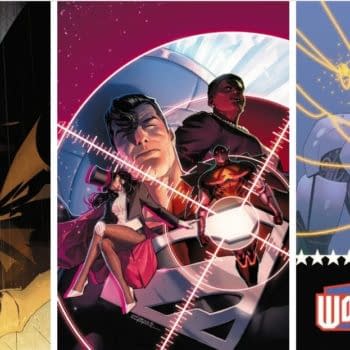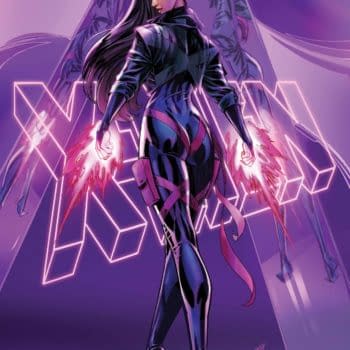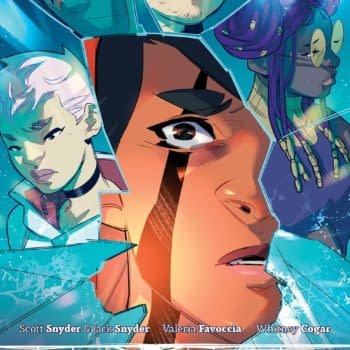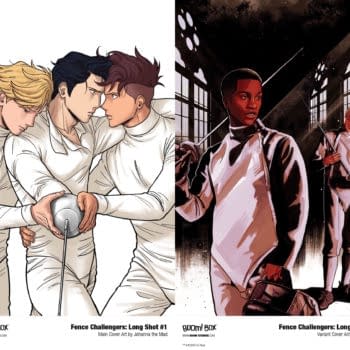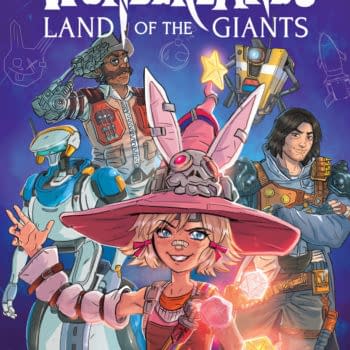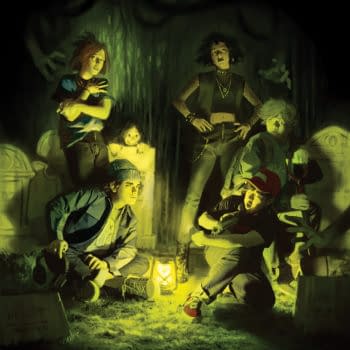Posted in: Comics | Tagged: Comics, hip hop, NYCC
Where Hip Hop And Comics Cross, Criss Cross, And Jump Up
Camille Manhat writes for Bleeding Cool;

Patrick Reed, editor of Depth of Field Magazine, asked the panelists to describe their first exposure to comics. DMC recalled the Amazing Spiderman and went to to explain how when he was young he wore glasses and was shy and felt a strong connection to peter parker. He shared his first memory of hip hop with being in the school yard trading comics and a classmate throwing an Eddie Cheeba cassette tape on and D couldn't get enough. From that, D sold his comics to buy DJ equiptment but never forgot how those books helped him escape to a place he felt accepted.
Eric Orr is the creator of the first hip hop comic. In 1986 he released Rappin' MAX Robot. He wasn't sure how it would go over but then it went on to sell out at four times the cover price within one month and mostly to people in his own neighborhood.
Robin Wilson said that one of the most memorable times in his life was meeting Jack Kirby after his comic was released. Kirby shook his hand and said "Do it your way son,just do it your way." Orr was excited and grateful to be at NYCC..it was his first time attending and he was glad to have his kids with him for the event. He still has love for comics but has been doing more album cover art than anything right now.
Pete Rock went on to say that he always felt inspired by groups of superheros working together and could relate to The Hulk the most. Public Enemy DJ Johnny Juice concurred. Juice, on the same page with Pete Rock with the whole group effort theme, also added that Public Enemy was like a super hero squad. Everyone has a specific job and has to work together. Juice then humorously went on to exclaim that comic book fights inspire his DJing and gives him the thirst to "kick your ass through scratching!"
Interestingly enough, MC Jean Grae, grew up above a comic book store, has a brother who is a few years older who loved comics and she herself got into them as a direct result. Jean also felt growing up in the 70s and 80s like sort-of an outcast and like fellow panelist DMC, she was comforted by the relatability of Peter Parker in The Amazing Spider-Man. Jean feels that with her comic background makes her a better writer, owing a special thanks to comics for her vivid imagination. She leaves off jokingly stating that she chose the name Jean Grae and not Storm because it would've been too obvious!
When Reed asked Adam Wallenta his take on the relation between comic books and hip hop he stated that he always felt as if they went hand in hand. People used to always say to him that hip hop, like comics, would corrupt your mind. Willenta feels if you love either one that you can see the positivity in both and if you were like him you'd feel like the two just blatantly visually belong together.
As for Ron Wimberly I admired his honesty when he stated that he really had no clue why Reed asked him to even be on the panel! He said that he was not thrilled that his Prince of Cats was being labeled a hip hop comic and almost took it as an initially racist description. His mind was put at ease when DMC said simply strive to create a great comic and if you are hip hop it will inevitably shine through. You cannot divorce an artist from his culture and influences. This came as a great epiphany to Wimberly, solidifying his purpose of attendance.
I think Kagan McLeod really hit the nail on the head when he said that every hero is more fragile then the villain because they have a moral compass they must balance.
Comic books already have a timeline, they can feed off their own history of the world but hip hop can't because its history has been written by others. It is still striving to become a hero to itself. Reed ends the questioning on this note because it basically summed up the purpose for the panel.
Upcoming projects:
Ron Wilson- Battle Rappers, an intriguing idea that aliens have been studying humans and hip hop and have started rapping themselves! Now they've come for us and we must battle rap to save the planet!
Pete Rock- Has a digital comic in the making as well as an lp
Adam Wallenta– working on some album covers and a project called family first
Gene Grea– two albums coming soon and a comic with mike hawthorne
DMC– A hip hop comic in progress and will be official for the world to see in eight months!







